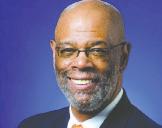




BY LAURA NWOGU
If you’re entrenched in the Atlanta Pilates world, you’ve likely heard of or taken a class with Dr. Tanya Stephenson. A licensed chiropractor, Stephenson is the founder of Stretch ATL, the first Black-owned Pilates studio in metro Atlanta, which opened in 2013 at 2033 Metropolitan Pkwy.
For over a decade, she’s been building community and helping people align their mind and body, from watching miraculous transformations of people who had been in accidents regaining the ability to walk to offering pop-up classes around metro Atlanta.
Now, she’s celebrating the grand opening of her second location in Buckhead at 2293 Peachtree Rd (Floor 3). The Atlanta Voice talked with Stephenson about the growth of Stretch ATL and the rise in popularity of Pilates within the Black community.
The Atlanta Voice: You opened the first Black-owned Pilates studio, Stretch ATL, in 2013. How did it feel for you to be able to do that for the community?
Dr. Tanya Stephenson: “It was the driving force for me. It was not present in the community, and I felt the need to be that pioneer for it. And so while doing that, it had its plus and minuses. The plus was that I was able to bring it to the community. Some of the community saw it, never tried it, but were interested. There's also the skeptical aspect because Pilates is not very inexpensive. I did as much as I could to make it affordable by reducing the class times; instead of 45 minutes to 1-hour sessions, I did a 30-minute session that gave them everything that they needed inside of that. That kind of gave them the idea of what it was. But once I got them to jump in, they joined the studio.”
AV: That’s so interesting to hear because, from my perspective, Pilates has become so much more popular and accessible in the past few years. There’s been this idea attached to it that the exercise is for rich, white women. Can you talk more about opening a Black-owned studio before this wave hit?
TS: “The kicker was that I decided to do a Groupon. On the Groupon, it was a Black girl on the reformer. I did that intentionally so that they wouldn't think it was another studio that was already available to them. And then to have it in the community made for a huge amount of interest. I got overwhelmed, actually, with that. That was my strategy to introduce it to the community, and it worked.”
AV: Taking it back a bit, where and when would you say your love of Pilates began?
TS: “When you're in chiropractic school, you're there for four years plus. You have to learn how to adjust, and you learn by work-


ing on your colleagues or or your classmates. Like I said, they're practicing. Just as well as they can help you, they can hurt you. While I was in chiropractic school, I also had a baby,
and so with that, I got some bad adjustments from my classmates. After having her, I was really not myself afterward, so I had to stop letting the students adjust me and let only
my professor or my doctor adjust me. When I started Pilates, it just kind of sealed the deal. Pilates helped me get my body back after the baby.”
AV: What do you think it is about Pilates that has made it so popular and accessible in the past few years?
TS: “One is the way it makes your body feel. You become aware of your body in terms of learning what good posture feels like. It will definitely bring you to reality with yourself. The other is the fact that it wasn't available but yet I brought it to the community. What's also a beauty is that it's not a drag-out fight — it's a softer drag, you know? It’s not lifting weights. It's not perspiring like crazy.
“I think people are becoming more aware that the wear and tear of the body really does impact your quality of life. Pilates is a functional type of work; the things that you do in class, you take it home and you take it to work, and you take it to the desk that you sit at every day. I think that's one of the main reasons that it has become such a popular thing, and the girlies love it. The guys are
BY DONNELL SUGGS
Atlanta is known by many monikers worldwide, but the one that seems to stand the test of time is the “Black Mecca” of the United States. On Wednesday night in Summerhill, inside the neighborhood’s JPMorganChase branch, the New York-based banking giant hosted a speaking engagement featuring a pair of Black business owners and entrepreneurs. The lobby and main room of the branch were full of guests, including journalist and television host Portia Bruner and T. Dallas Smith Principal and COO Dexter Warrior, waiting to hear from Daymond John, founder and CEO of The Shark Group Agency, founder of FUBU, and original cast member of the television series “Shark Tank” and Tracy Nicole, a Decatur-born business owner, clothing designer and author.
“We don’t always talk about investments because we don’t come from legacy wealth,” said John, who hosted his Black Entrepreneurs Day event on Friday, November 22, at the Fox Theatre.
The pair took questions from Brigitte Killings, the evening’s moderator and JPMorganChase Director of Community and Business Development. One of the first things Killings asked John and Nicole was who their first role models were. John answered that boxing legend Muhammad Ali was his, while Nicole said her grandmother was hers. Asked if they could go back in time and give their younger selves any advice, Nicole said she would tell her younger self to “dream bigger.” John said he would tell his younger self to spend more time pursuing “financial intelligence.”
The fact that the discussion was taking place inside a financial institution in Summerhill, one of Atlanta’s oldest neighborhoods, was also worth celebrating alongside the forthcoming Black Entrepreneurs Day. Summerhill was once an All-Black neighborhood and could have been described as a bank desert for its lack of a bank branch during the past decade-plus. The JPMorganChase Summerhill community branch opened in March of 2023 along with several small businesses like Black-owned restaurant Grits & Eggs and many residential projects. A renaissance has been taking place in the shadow of the former home of the late great Hank Aaron and the Atlanta Braves.
Prior to the start of the event, Nicole told The Atlanta Voice that sharing information on wealth building and entrepreneurism is a necessary good. “Being an entrepreneur is all about business, and the only way to be a successful entrepreneur is to learn business and financial planning,” Nicole said.
During a one-on-one interview with The Atlanta Voice, John said the “Easiest thing to sell is the truth,” so why not share business and entrepreneur tips with the public if you want to foster a better and stronger business community.
“Money is a tool, wealth is a tool, and
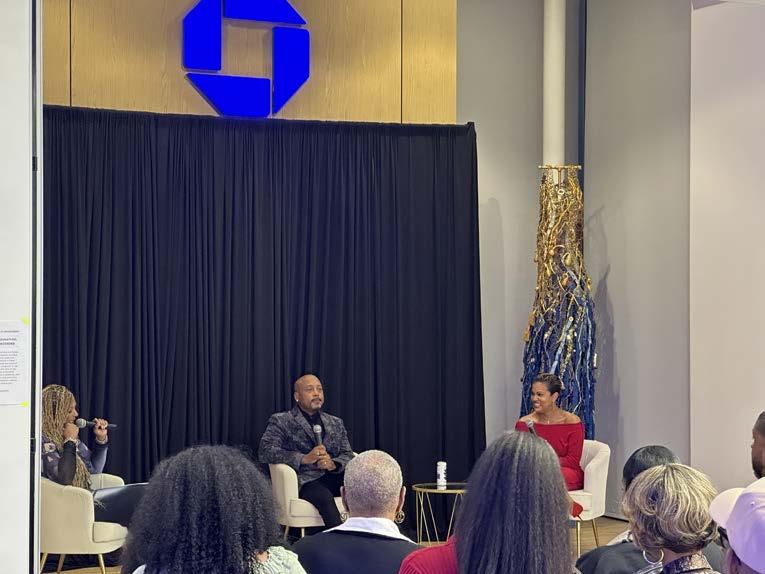
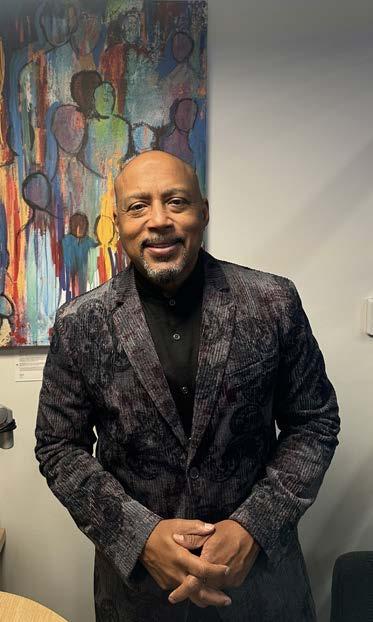

those tools help you change everything around you,” John explained. “The more wealth you have, the more you can employ people and make decisions.”
John used examples of being able to donate to charities or improve communities when money is circulated throughout them.
About money, he said, “When you get it, you can make things move. If you don’t, you’re a customer. Either you’re selling it, or you’re buying it. It’s that simple.”
John spoke about the wealth management capabilities of banks like JPMorganChase when investing money and building
wealth. “When I first started, I wasn’t going into the bank,” John said. “As far as I was concerned, the bank worked for the government.”
John used a common example of misusing finances when he shared a story of cashing his paychecks or checks at a check-cashing place. Though in small increments, the percentage of money over time added up. “I went and paid 10% of the check to the person next door at the check cashing place and I gave that money away,” he said. “We need to understand the power of investing. When people think about investing, they
“We don’t always talk about investments because we don’t come from legacy wealth,” said Daymond John, who hosted his own Black Entrepreneurs Day event a few days later on Friday, Nov. 22, at the Fox Theatre.
think about these big forms of investing.”
Using a total of $1,000 as an initial investment, John explained that the $1,000 in the bank would accrue by 3%, while that amount of money in Apple stock, for example, could make three or four times that money.
He said that people can find out about how to invest their money the same way “You find out about what bag to buy, what trip to go on, on what new album is out and what concert is coming to town.”
John said he invests in things that, if they go away, would disrupt his life. He used Uber, Airbnb, Instagram, Facebook, and WhatsApp as examples. The same could likely be said for the people in that room on Wednesday night and throughout Atlanta and the United States as a whole.
“We’re investing in Atlanta’s Black entrepreneurs because we want them to succeed professionally and personally. Too often, entrepreneurs will solely depend on the value of their business for their financial security. Still, a business is not a retirement plan,” said Mark Adams, Regional Director at J.P. Morgan Wealth Management.
“We hope to empower more Black entrepreneurs as they work towards their personal financial goals and business goals,” Adams said.
Nicole added to Adams’ point, saying, “Atlanta is the melting pot of talent, and entrepreneurship takes it to another level. To me, having your own business is the only way to grow. If you’re an entrepreneur, you can hire other people, support each other, and bring each other up.”
“History has shown us that courage can be contagious and hope can take on a life of its own.”— Michelle Obama
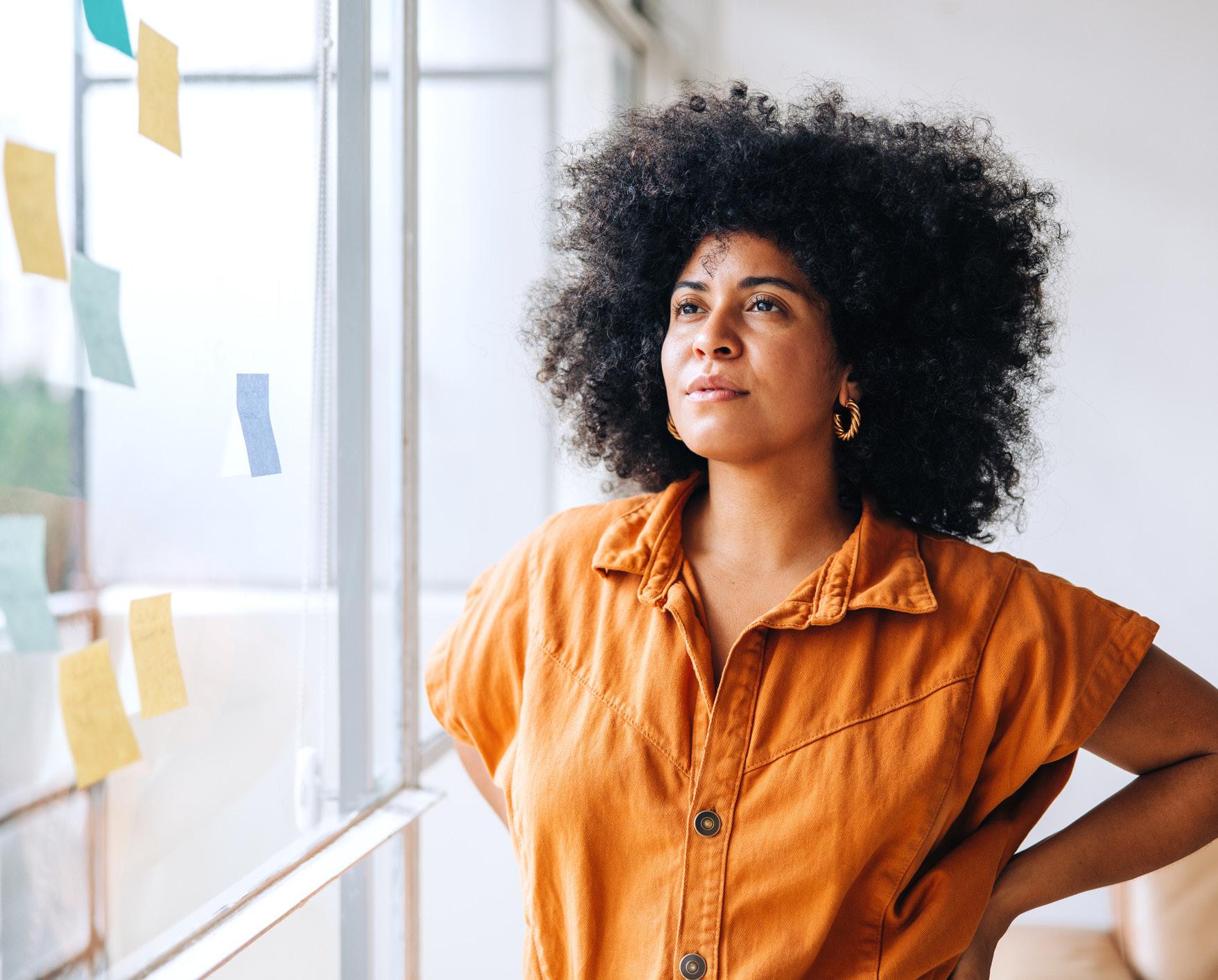
BY ASWAD WALKER
If this crushing election loss has taught us anything, we must get busy planning not for next week, next month, or the next election but rather for the next century— the next 100 years.
As folk are scrambling to assign blame regarding why Kamala Harris won’t be enjoying a Jan. 20, 2025 inauguration for the ages, they’re looking in all the wrong places. Some say the Harris campaign was too centrist, bending backward to appease and attract Republicans. Others say the Harris campaign went too far in seeking to expand the Democrats’ tent and should have gone hard in the paint to lock down the Democratic base.
Some believe a harder stance against the genocide in Gaza would have made a difference. Others point to President Biden and say he waited too long to drop out of the race, leaving Harris with only 100 days to mount a presidential campaign—something unheard of in modern politics.
They were successful because they had been
working, pushing and planning for this aim for years—actually, for decades.
Take, for example, “Project 2025: A Mandate for Leadership.” The Heritage Foundation, the white nationalist think tank that spearheaded this blueprint for American apartheid, has been publishing their “Mandate for Leadership since 1981. So, each year, for the past 43 years, they have been scheming, planning and organizing to put Black people and women “back in their place.”
But before that, in 1964, in the midst of the Civil Rights Movement, Barry Goldwater and crew literally conspired to make the Republican Party the official/unofficial “white people’s party.” Please look it up yourself, if you don’t believe me… and even if you do. That’s 60 years of cementing the GOP as a “white’s only” political party. And Donald Trump’s right hand man Stephen Miller reiterated the point just this week.
Oh, they accept white-identifying Blacks, Asians and Latinos—anyone who will slave for their cause. But make no mistake; their cause
is whiteness, and laws and policies and institutional mandates to back it up and enforce it.
And before that, in the 1850s, the Native American Party touted the slogan “America First” as a rallying cry for racist white Protestants to stop Catholic immigrants (Irish and others, who at that time were not considered white) from invading the country and stealing white jobs. That was 174 years ago.
My point: They have been on this anti-Black, anti-other tip for centuries; forever devising new ways to protect whiteness. And there’s a gazillion more examples I could share.
But they ‘gon do what they ‘gon do. The real question is “What we ‘gon do”?
The only acceptable answer is to plan not only for next week, next year, or next election but rather to plan and strategize and organize and fundraise and work and build with the next 100 years in mind. I guarantee you, the folk who have always seen you and me as less than human, have already drawn up their game plan for Project 2125 and beyond.
FOUNDED May 11, 1966 FOUNDER/EDITOR
Ed Clayton Immortalis Memoria
PUBLISHER/EDITOR
J. Lowell Ware
Immortalis Memoria
The Atlanta Voice honors the life of J. Lowell Ware.
PUBLISHER
Janis Ware
PRESIDENT/
GENERAL MANAGER
James A. Washington 2018-2024
EXECUTIVE ASSISTANT TO PUBLISHER
Chia Suggs csuggs@theatlantavoice.com
EDITOR IN CHIEF
Donnell Suggs editor@theatlantavoice.com
GENERAL ASSIGNMENT REPORTERS
Isaiah Singleton isingleton@theatlantavoice.com
Laura Nwogu lnwogu@theatlantavoice.com
EDITOR AT LARGE
Stan Washington swashington@theatlantavoice.com
MANAGING EDITOR, DIGITAL Itoro Umontuen iumontuen@theatlantavoice.com
ADVERTISING, SALES & CIRCULATION
ADVERTISING ADMINISTRATOR
Chia Suggs advertising@theatlantavoice.com
CIRCULATION MANAGER
Terry Milliner
SALES
R.D.W. Jackson rdwadman@gmail.com
SUBMISSIONS editor@theatlantavoice.com
DIRECTOR OF PUBLIC RELATIONS
Martel Sharpe msharpe@theatlantavoice.com
CONTACT INFORMATION
633 Pryor Street, S.W. Atlanta, GA 30312
Office: 404-524-6426 info@theatlantavoice.com


BY JAMES A. WASHINGTON
The Atlanta Voice
ave you ever found yourself surrounded by people who absolutely bring out the worst in you? When you are in their presence, you wind up engaged in everything you know you’re not supposed to do. As a kid, that might be staying out late, hanging with the wrong crowd, experimenting with sex and drugs, or stopping just the other side of criminal behavior, as an adult, that could range from adultery to debauchery, from personal abuse to deliberate manipulation and greed.
The situation seems exacerbated by the environment and the people you let frequent your airspace. Deep down, somehow, you know what you’re doing is wrong, but either you rationalize your behavior or those with whom you’re hanging rationalize it. If you go deep enough, bad behavior becomes some badge of honor to those who do bad with you. It’s easy to find encouragement to sleep around, get high, steal, procrastinate, and hate. A crowd will gather instantly to see you pave your
There is no depth of spirit that He can’t reach
way to hell. They’ll even provide a full-piece orchestra and a ticker tape parade. For those of you who have been saved, do you remember the first voice you heard trying to tell you about the errors of your ways?
Do you remember whether it was mama, grandmamma, sister, or a plain old good friend? Do you remember how important it was to explain your bad behavior? Do you remember how incensed you became because they couldn’t or wouldn’t accept your explanation that you were playing the hand that life dealt you? Remember, your ultimate answer was to go back to those who knew the real deal and did the same things you were consumed with. Then, a funny thing happened. In the middle of what was once so good to you, those words of the people who loved you began to get louder and louder, and one day, the sex wasn’t as good any-
“YOUR VOICE”
more. The high wasn’t fun anymore. The hate wasn’t satisfying anymore. The attraction had become an addiction, and no matter how hard you tried, the thrill was gone, replaced by the words that reminded you that there was a better way. I’m told that one of the first things a recovering addict must do is change the environment in which they hang out. Replace negative people with positive ones. Look for and find circumstances that will reinforce positive behavior. Isn’t that the way with God? Isn’t Christ the ultimate role model? Doesn’t He remind us that you cannot get low enough where you can’t be found? There is no depth of spirit that He can’t reach. Any church that’s a real church is full of sinners rather than saints, people who’ve licked the bottom of the barrel and lived to testify that Jesus indeed will remove the splinters from your tongue also.
“And let us consider how we spur one another toward love and good deeds.” Hebrews 10:24. Take heed of who you hang around with. Put some stock in believing that a community of believers cannot be denied. People who love you are far more valuable to your soul than people who would otherwise use you. The next time you find yourself in questionable circumstances, look around the room and count those in attendance who you know have your best interest at heart. If you get to one besides yourself, stay. If you’re the only one there, realize you’re outnumbered and get the hell out of Dodge. All it takes is one time, and Christ will accompany you from that point.
Until then, may God bless and keep you always.
This column is from James Washington’s Spiritually Speaking: Reflections for and from a New Christian. You can purchase this enlightening book on Amazon and start your journey toward spiritual enlightenment.

When it comes to raising children, what’s one thing you would do differently from your parents?
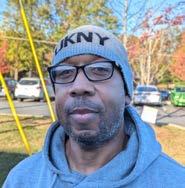
College Park
"What I would do differently from my parents when it comes to raising my kids, I have a daughter, and so I think I would be more open to conversation, you know, and be in a place where, you know, my daughter can come and talk to me about any and everything. My daughter is 23 now, so what I really would like to have done, or what I'm doing now, is interacting and talking with her more. And that's something that I wish that you know, my dad would have done more with me and, you know, my mom."
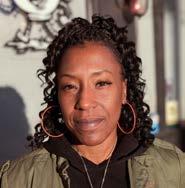
Atlanta
"What I would do differently from my parents in raising my children is be more loving and softer. My parents were disciplinarians, and I felt I had to earn everything like nothing was given. It made me less entitled, but it also made me feel like I don't deserve anything without working for it, which essentially makes me a bit of a slave and not receptive to somebody showing me love genuinely. So, I wanted to do that for my kids, like show them what love looks like because sometimes I don't know because I had to earn everything."

Atlanta
"What I would change is when you want to tell your kids yes or no or why they can't do something, they explain why they can't because kids are smarter than you think, and they can understand reasoning. That would be something that I would change if I were raising kids today.

Atlanta
"I would ensure my children know how to deal with their emotions through meditation and sound healing. I would treat both genders, female and male, the same. Males and females are not treated the same. So, if you have more than one child, it can be challenging. So, I don't want to play favoritism. And I wouldn't put my hands on my children. I would ask them to think about what they've done and find other, you know, harmless approaches for that.
Compiled by Vincent Christie.

BY STAFF REPORT
The United States Attorney’s Office for the Northern District of Georgia and the Department of Justice’s Civil Rights Division announced its findings concluding that Fulton County and the Fulton County Sheriff’s Office routinely violate the constitutional and statutory rights of persons incarcerated at the Fulton County Jail and fail to adequately protect incarcerated persons from substantial risk of serious harm.
“In Fulton County, people in custody awaiting formal charges or trials frequently must protect themselves from brutal physical attacks, endure frequent excessive force, manage their wellbeing with inadequate food and unsanitary living conditions, and hope they can find access to a strained medical and mental health care program. This is unacceptable,” said U.S. Attorney Ryan K. Buchanan. “Our Constitution requires humane conditions while incarcerated that, at a minimum, ensure people in custody are safe. The findings regarding the Fulton County Jail reveal grave and diffuse failures to safeguard the men and women housed in its facilities, including a disturbing frequency of deaths among incarcerated people. We expect Fulton County and the Fulton County Sheriff’s Office to share our sense of urgency about the seriousness of the violations described in this report and to work cooperatively with our Office and the Department of Justice to remedy these systemic deficiencies in the Jail.”
“Lashawn Thompson’s horrific death was symptomatic of a pattern of dangerous and dehumanizing conditions in the Fulton County Jail,” said Attorney General Merrick B. Garland. “The Justice Department’s report concluded that Fulton County and the Fulton County Sheriff’s Office allowed unsafe and unsanitary conditions at the Jail. As a result, people incarcerated in the Fulton County Jail suffered harms from pest infestation and malnourishment and were put at substantial risk of serious harm from violence by other incarcerated people — including homicides, stabbings and sexual abuse. The unconstitutional and unlawful conditions at the Fulton County Jail have persisted for far too long, and we are committed to working with Fulton County and the Fulton County Sheriff’s office to remedy them.”
“We cannot turn a blind eye to the inhumane, violent, and hazardous conditions that people are subjected to inside the Fulton County Jail,” said Assistant Attorney General Kristen Clarke of the Justice Department’s Civil Rights Division. “Detention in the Fulton County Jail has amounted to a death sentence for dozens of people who have been murdered or who died as a result of the atro -

cious conditions inside the facility. It’s not just adults but also children who are subjected to conditions and treatment that violate the constitution and defy federal law. Many people held in jails in our country have not been convicted — they are awaiting hearings, trial dates or are serving short sentences for misdemeanors. At the end of the day, people do not abandon their civil and constitutional rights at the jailhouse door. Jails and prisons across the country must protect people from the kind of gross violations and unconstitutional conditions that we have uncovered here. We hope our findings report sounds an alarm that will prompt Fulton County officials to work with the Justice Department to implement the reforms necessary to ensure constitutional conditions going forward.”
The 97-page report details its findings from a comprehensive investigation of the Jail, which is funded and operated by Fulton County and the Fulton County Sheriff’s Office. The investigation included the Main Jail, also known as “Rice Street,” in Atlanta and three annex facilities: the Marietta Annex in Atlanta, the North Annex in Alpharetta, and the South Annex in Union City. The Jail currently houses around 2,000 people and in recent years the population has surpassed 3,000 people.
The report concludes that the conditions of confinement at the Jail do not meet basic
constitutional standards. The noted deficiencies include the following:
• Fulton County and the Fulton County Sheriff’s Office fail to protect people from the substantial risk of serious harm from violence by other incarcerated people, including homicides, stabbings, and sexual abuse.
• Officers use excessive force against incarcerated people.
• The Jail houses incarcerated people in constitutionally inadequate living conditions that are unsanitary and dangerous.
• The Jail fails to provide adequate medical and mental health services.
• The Jail’s restrictive housing practices expose people, including 17-year-old children, to substantial harm, discriminate against people with mental health disabilities, and fail to provide incarcerated people due process of law.
• The Jail fails to provide special education services to 17-year-old boys and girls who are entitled to those services while they are incarcerated at the facility. The unlawful and dangerous practices identified in the report are long-standing and have contributed to multiple deaths and other serious harm:
• From 2022 to the present, six incarcerated people have died in violence at the Jail.
• In 2023, more than 300 stabbings occurred in the Jail which involved contraband and makeshift weapons.
• Four deaths from suicide happened at the Jail in the past four years, including as recently as April of this year.
The United States conducted its investigation under the Civil Rights of Institutionalized Persons Act (CRIPA), the Americans with Disabilities Act, and 34 U.S.C. § 12601, which prohibit law enforcement officers from engaging in a pattern or practice of conduct that deprives people of rights protected by the Constitution or federal law. These statutes authorize the Attorney General to file a lawsuit in federal court seeking court-ordered remedies to eliminate a pattern or practice of unlawful conduct. Fulton County and the Fulton County Sheriff’s Office have been provided written notice of the supporting facts for the conclusions in the report and the minimum remedial measures necessary to address the alleged violations.
The U.S. Attorney’s Office for the Northern District of Georgia joined together with the Department of Justice Civil Rights Division’s Special Litigation Section to conduct the investigation.
The case is being handled by Assistant U.S. Attorneys Tiffany Johnson, Aileen Bell Hughes, and Rebeca Ojeda of the Northern District of Georgia.
Continued from page 2
getting there. I have a huge number of professional ball players and collegiate ball players who have also come to understand that it enhances their skill set.”
AV: (laughs) I love seeing videos of men trying Pilates and leaving the class shaking.
TS: “It’s hilarious.”
AV: What are some benefits of Pilates that people may not be aware of?
TS: “When I was a chiropractic student, my mentor had a chiropractic practice in Marietta Square, and it was a small adjustment room. But when she showed me around, it was a huge room like this with a bunch of reformers in it. She explained to me that she sends all of her patients to Pilates, which makes it so they don't have to get on the table to be adjusted. So, it's an alignment thing; it is a form of chiropractic work. It's a form of aligning the body and getting the body to do what it wants to do because it does want to do the right thing — we just get in the way of the body.”
AV: You go into these classes, and you're actually seeing people who look like you and live in the same community as you. How important is representation in these spaces?
TS: “I shadowed her [my mentor] for a few years, and the whole time I worked with her, I never saw anybody who looked like me. She

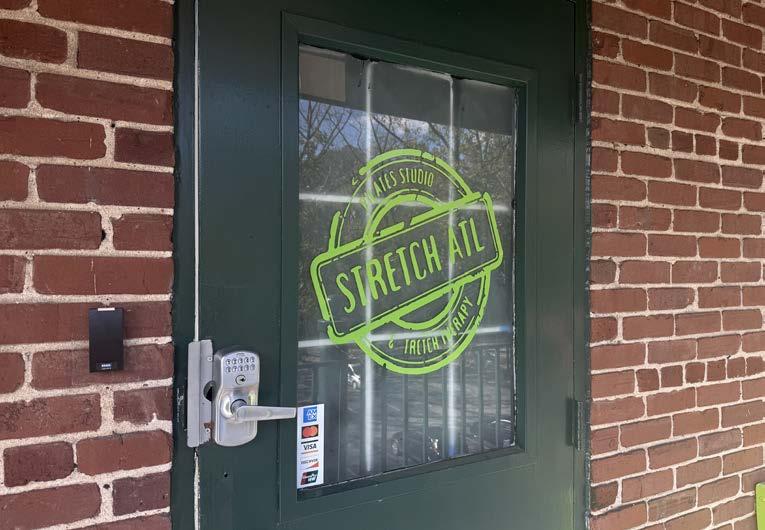
“So when you come here, you leave your junk outside, and we come in and we’re a collective. That’s what makes Stretch ATL quite different. We really make sure that we look out for each other,” Stephenson told The Atlanta Voice.
had a great, very established practice, but I never saw anybody who looked like me. And that was the horn that tooted in my head to say, ‘Take this to your community. Your community deserves this, too.’
“It's such an intrinsic reward. I know that those spaces were not open or not available or just weren’t knowledgeable enough for us
to be there. And I laugh sometimes because, on social media, the comments are hilarious. They’re like, ‘Look at all those Black people in there.’ I feel so accomplished when I get those kinds of compliments.”
AV: You just opened a second Stretch ATL location in Buckhead. What does it say to you about the growth of the studio, and
what does this milestone mean to you?
TS: “I would say this: for a very long time, if you happened to talk to a Pilates girl that looked like you in the Atlanta world, and they have Pilates experience, they generally have started with Stretch ATL. So, I really put a footprint in Atlanta for Pilates, and I think that footprint has made such a difference in terms of how the growth is going. Ideally, I'd like to be the mecca of Pilates in the area. I've really come a long way.”
AV: For those who have never been to Stretch ATL, what makes this Pilates studio so special, and what do you hope for the future?
TS: “I really come for the whole body. We talk about the food intake, we talk about the mindbody, and we create a community. So when you come here, you leave your junk outside, and we come in and we're a collective. That's what makes Stretch ATL quite different. We really make sure that we look out for each other.
“We also have a mobile unit, so everything that we do inside of the studio is on our mobile unit. You can do Pilates, you can do barre, you can get a one-on-one stretch, all in our mobile unit. We creatively brought that together and made that shine, and we are very, very proud of it. We're going to meet the people in the streets. If they can't make it to us, we're going where they are.”
This interview was edited for length and clarity.

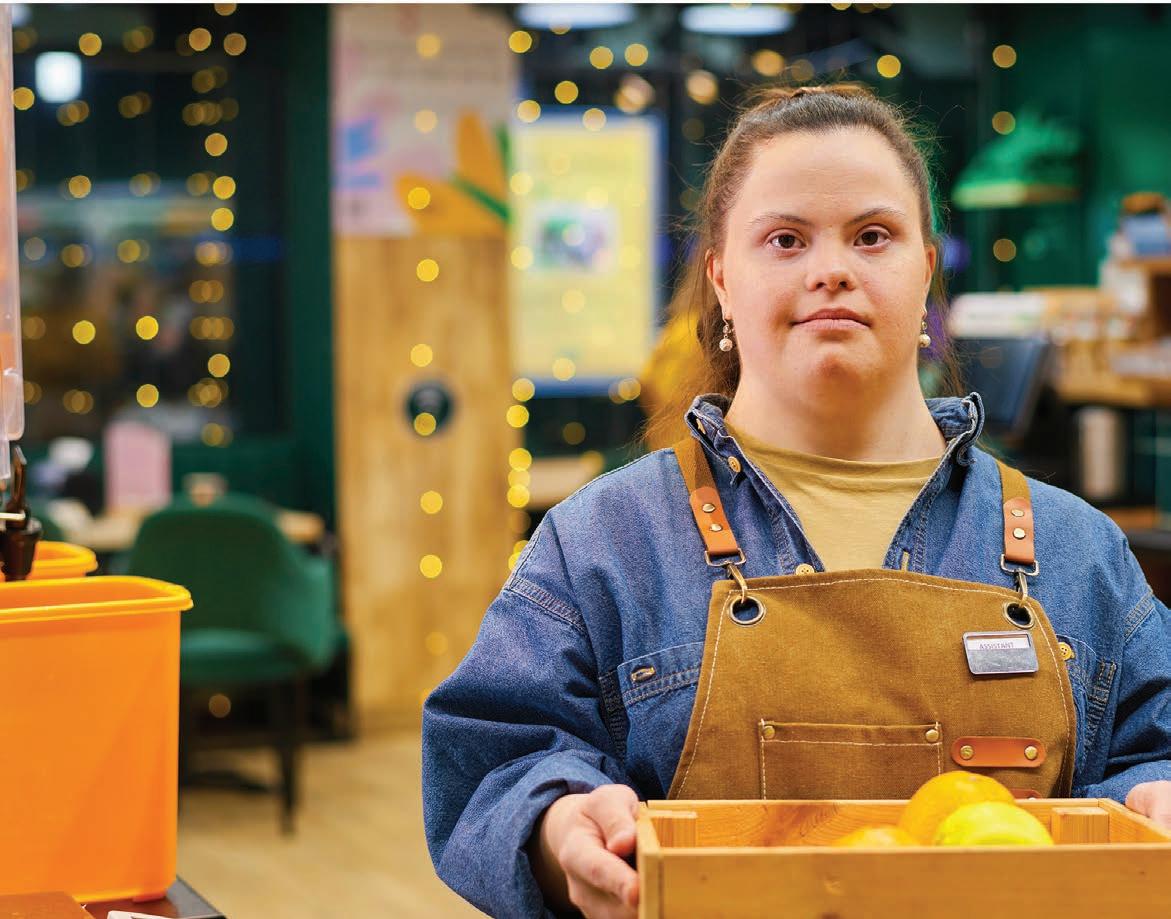
BY ITORO N. UMONTUEN
During a cold night in Atlanta, a reception took place in Buckhead in honor of Delta Air Lines’ inaugural flight connecting Georgia’s capital city and the vibrant island of Barbados. Delta will have daily service from Hartsfield-Jackson Atlanta International Airport to Grantley Adams International Airport (BGI) in Bridgeport, Barbados.
Attendees were treated to excellent foods native to the Caribbean island and Bajan rum!
Barbados’ Minister of Tourism, Ian Gooding-Edghill, highlighted the country’s recent accolades, including winning the destination category at the Roots America’s Awards and being named the best culinary festival and national culinary team in the Caribbean.
“I must acknowledge that United States of America continues to be one of Barbados’s leading source markets,” said Gooding-Edghill. “Delta’s Director of International Special Sales announced the new service, which includes daily flights from Atlanta and Saturday flights from New York City’s John F. Kennedy International Airport with over 25,000 bookings already. The partnership aims to boost tourism and business connections, emphasizing Barbados’ culinary and cultural offerings.”
The move is beneficial for both sides
The Barbados Tourism board seeks to directly engage with the Barbados Association of Georgia and other diaspora organizations in Atlanta. They desire to promote the new direct flights and highlight the upcoming signature events and celebrations in Barbados in 2025. They believe this will help generate excitement and interest within the local community.
“It’s a beautiful thing,” exclaims actress and film producer Jacqueline King-Howell. “Before, I would have to go to New York or Miami to get to Barbados, so I’m very happy to have a direct flight. For me, it’s going home, but it’s also a really good escape. The people are amazing, the food is amazing, the culture is amazing. It’s not just tourism. There’s so much that Barbados has to offer, and I love that we celebrate all of our wins.”
Both sides believe it’s about strengthening the bond between the dynamic city of Atlanta and the serene paradise of Barbados.
“From Delta’s perspective, it’s a symbol of the strength of the market that we were able to jump in not just on Saturday, but daily non stop from Atlanta, in addition to Saturday service from JFK,” said Shane M. Spyak, Managing Director of International Sales with Delta Air Lines. “So it’s very rare that a new market begins from multiple gateways. The first flight tomorrow is going to leave completely full.”
In the end, the tourism sector in Barbados loves to welcoming more visitors for paradise, for leisure, culinary experiences, sports and business. They believe this venture will help Barbados remain the top of mind destination for all American travelers.
“So having this event tonight and collaborating with Delta, I think it’s a beautiful thing,” says King-Howell. “It’s like two power houses coming together in a way that we’ve wanted, and now we have it. And more people get to experience Barbados and just get to see the beauty of the country on all levels.”


BY NOAH WASHINGTON
The Atlanta Hawks Basketball Academy and Atlanta Tipoff Club hosted the fifth annual Hawks-Naismith Tip-Off Classic, presented by Adidas on Saturday. The one-day basketball showcase occurred at Holy Innocents’ Episcopal School and featured 12 high school basketball teams in six matchups.
Game Lineup:
• Marist vs. North Paulding (Girls)
• Paideia vs. Shiloh (Boys)
• Marietta vs. Holy Innocents (Girls)
• Wheeler vs. Gainesville (Boys)
• Pace vs. Holy Innocents (Boys)
• Decatur vs. McEachern (Boys)
Before the tournament, the Hawks hosted a free Jr. Hawks Youth Basketball Clinic sponsored by Attorney Ken Nugent.
Chris Jacobs, Senior Director of the Hawks Basketball Academy, who has been with the Hawks for the last six years, emphasized the academy’s mission, “Our goal is to build generational fans for the Hawks by giving kids a basketball journey—whether they play in junior high, high school, or college, or simply become fans of the game. Basketball teaches life skills like leadership and teamwork.”
Jacobs explained that the clinic, which allowed approximately 100 kids to participate in an hour-long session led by youth basketball coaches and featuring Hawks alumni Mario West and Cedric Tony, serves an important purpose, “This event is focused on high school teams, but the clinic ensures we touch younger athletes, exposing them to the Hawks Basketball Academy and the sport itself,” Jacobs said.
Quinton Stephens, Manager of Basketball Programs, the man on the ground with the young attendees, spoke about the impact of moments like these, “I grew up going to the YMCA, and now I get to give back to kids who aspire to play at different levels. We can challenge them and give them a blueprint on how to get there,” Stephens said.
A highlight of the day for Stephens was the arrival of former Hawks player Joe Johnson, whose presence inspired excitement among clinic participants. Stephens recalled, "One of the kids said, ‘Hey, that’s Joe Johnson!’ and Joe gave him a high five. It was pretty cool.”
“We aim to replicate the State Farm Arena experience at the high school level. From the LED boards and DJ to the entertainment between quarters, we create lifelong memories for players, coaches, and spectators alike.”
He also shared details about the meticulous planning behind the event, which begins nearly a year in advance, “We collaborate with schools, identify teams across Georgia,
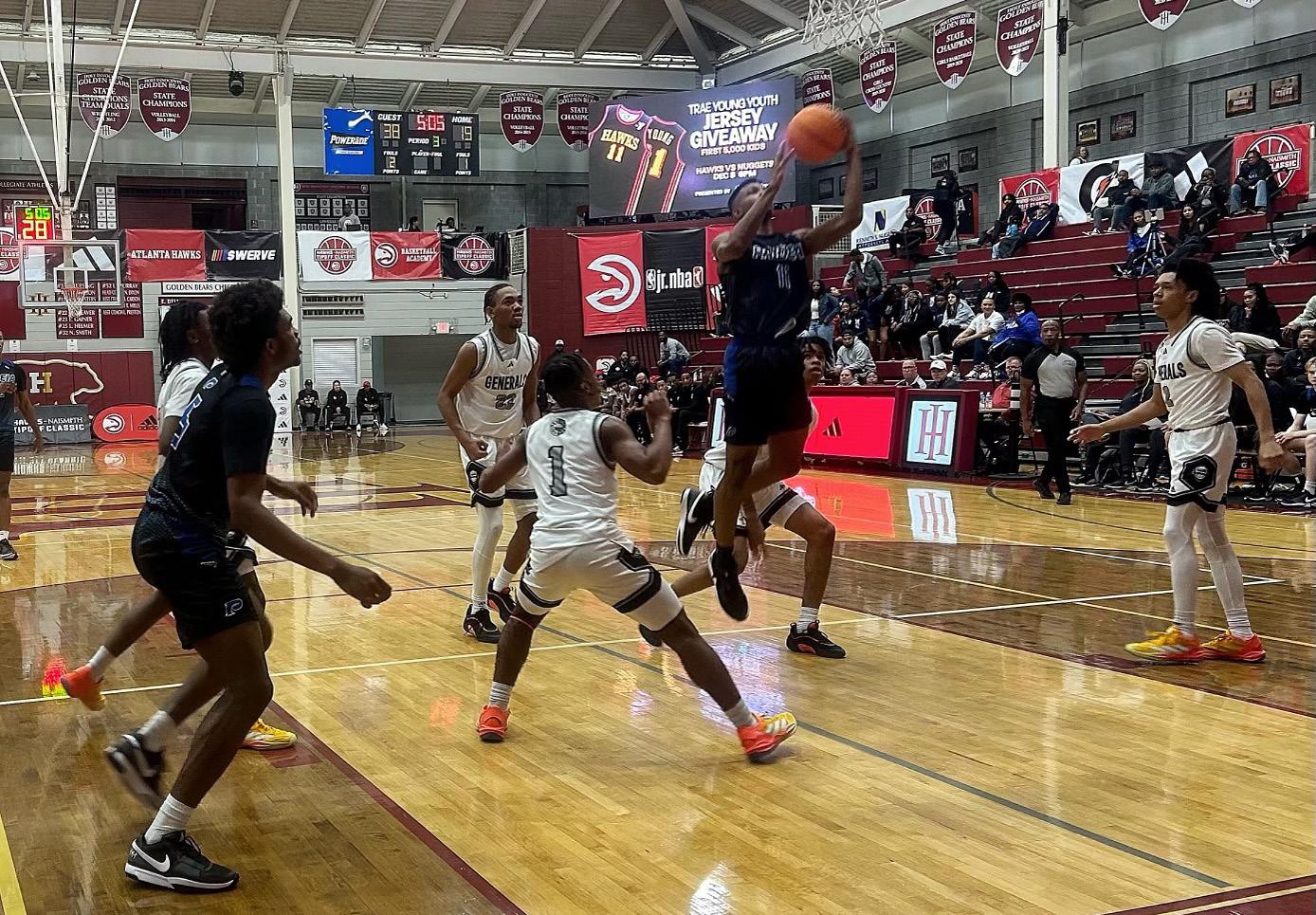

and curate a day that celebrates the state’s rich basketball talent,” Jacobs explained.
Holy Innocents’ head girls varsity basketball coach, Nichole Dixon, who has been with the school for nine years, spoke about
the home-team advantage and the privilege of hosting the event for the third year: "We're honored to be a part of one of the best events in our state. Every detail is top-notch, and it’s inspiring for our players to see what it
takes to create something of this caliber. It shows them how teamwork and diverse talents come together to achieve success.”
For Dixon, the event embodies the values of collaboration and growth—principles she hopes her team will carry forward in life as well as in sports, “This event is so much more than basketball—it’s about exposing our young athletes to excellence, both on and off the court,” Dixon stated.
Dixon’s aspirations for her players included learning from the high-level organization of the event and appreciating its diversity, “We talk a lot about using a diverse group of people with unique talents to achieve goals, and that’s exactly what this event demonstrates,” she said.
Nugent’s Scores for Scholarships initiative added another purpose to the event, donating $1 for every point scored to the Atlanta Hawks Foundation. These funds will support youth participating in Hawks Basketball Academy programs.
As the day unfolded, Jacobs and Stephens hoped participants left with more than just basketball skills, “We want kids to see how fun basketball can be and inspire a love for the game that lasts generations,” Stephens said.
BY QUINTESSA WILLIAMS WORD IN BLACK
In yet another controversial pick for his second-term cabinet, President-elect
Donald Trump has named Linda McMahon, co-founder of a pro wrestling league and former head of the federal Small Business Administration during Trump’s first term, to lead the Education Department — an agency he’s promised to close.
Like Trump’s other picks, McMahon — who helped her now-estranged husband Vince McMahon launch World Wrestling Entertainment and unsuccessfully ran twice for Senate in Connecticut — brings little relevant expertise or experience to the department he wants her to lead. She does, however, have experience on the WWE wrestling mat.
And like other Trump cabinet choices, McMahon has had to contend with a sex scandal: in October, she was named as a co-defendant in a suit brought by five WWE “ring boys.” The men allege that, from the 1970s to the 1990s, Melvin Phillips Jr., a WWE announcer, groomed them, then sexually assaulted them as the McMahons turned a blind eye.
In a statement, Trump said Linda McMahon “will fight tirelessly to expand ‘Choice’ to every State in America, and empower parents to make the best Education decisions for their families.” He called her a “fierce advocate for Parents’ Rights,” a movement that wants tax dollars used for school choice but not for school diversity, equity, and inclusion efforts.
McMahon’s confirmation, however, could be bad news for Black K-12 students in public schools, affecting everything from school funding to civil rights protections for vulnerable groups, including students who identify as LGBTQ+.
In a letter to members, the National Association of Educators vowed to fight McMahon’s confirmation. Becky Pringle, NEA’s president, compared McMahon’s nomination to former Education Secretary Betsy DeVos, Trump’s first-term education secretary. A wealthy heiress, DeVos had previously dabbled in education policy in her home state of Michigan.
Like DeVos, McMahon “is grossly unqualified and has no background in public schools,” Pringle wrote. “She has no business making decisions about our students, their education, or safety.”
Veteran teacher and education activist Jesse Hagopian wrote on Instagram that McMahon’s mission “is to privatize schools, outlaw honest education about race, gender, and sexuality, and abolish the department of education.”
Here are four key areas McMahon could

Former WWE president Linda McMahon’s nomination as Secretary of Education has left little confidence among educators. Photo Ctedit: iStock.com/MichaelJung
significantly alter on future policies and what it will mean for Black K-12 students:
Under previous presidential administrations, the Department of Education played a critical role in enforcing civil rights protections in schools. Its Office of Civil Rightsinvestigates bias complaints and ensures that schools do not discriminate based on race, color, sex, or disability.
While the extent to which McMahon will prioritize these efforts is unclear, Trump has shown no love for diversity, equity, and inclusion initiatives. Without national enforcement, Black and other students of color are vulnerable to discrimination.
McMahon’s firm stance on school choice could lead to increased funding and support for charter schools and taxpayer-fund-
ed voucher programs for students to attend private schools. Supporters say the programs provide alternatives for families in underperforming school districts.
However, research has shown they often divert resources from public schools, which disproportionately impact Black students in underfunded or majority-minority districts.
During the presidential campaign, Trump promised to empower state and local governments to make their own decisions on things like curriculum and school funding. McMahon will likely help fulfill that promise. However, experts say it would widen education disparities, including Title I federal funding, which supports schools with high proportions of low-income students.
A disproportionate percentage of Black students attend Title I schools, which rely on Ed Department funding for essential services like tutoring, after-school programs, and specialized support staff. Ending fed-
eral oversight could jeopardize this funding and diminish opportunities for Black students to succeed.
McMahon’s business background and tenure with the Small Business Administrationsuggest she will likely emphasize vocational and career readiness programs. She’s strongly advocated for aligning education with workforce needs.
While this could mean increased pathways to vocational and employment opportunities, an overemphasis on vocational education could inadvertently limit Black student’s access to higher education and other diverse career paths.
Overall, while McMahon’s appointment aligns with Trump’s plan to overhaul education policy at the national level, — it could also raise more concerns about educational equity for Black students and uncertainty about whether such challenges will be addressed.
BY ITORO N. UMONTUEN
The Georgia Education Savings Authority voted Monday to approve rules for the state’s new school voucher program.
The Georgia Promise Scholarship program offers $6,500 education savings accounts to students zoned for any public school in Georgia’s bottom 25% for academic achievement. The monies can pay for textbooks, transportation and home-schooling supplies. Plus, scholarships can pay for therapy, tutoring and early college courses.
A student must either have attended a public school for two consecutive semesters or be a kindergartner about to enroll. Parents also have been Georgia residents for at least a year. Only students in families earning no more than 400% of the federal poverty limit – currently $120,000 a year for a family of four – would qualify.
The program will start accepting applications in January 2025. However, Georgia’s General Assembly must determine how many scholarships the state will pay for. The law creating the scholarship program mandates a spending cap of 1% of the
$14.1 billion that Georgia spends on its K-12 school funding formula. As a result, $141 million can be spent on the scholarship program, providing at least 21,000 scholarships.
“What you have before you is a responsible piece of legislation that will enhance the educational options we give children,” said House Speaker Pro Tempore Jan Jones, a Republican from Milton, during the debate regarding the legislation. “I have rarely encountered regular citizens who wanted fewer options.”
If a parent wants to use the money to pay for part of a private or homeschooled education, the money would be placed into a Promise Scholarship Account. Additionally, if a parent wants to draw down those funds to pay tuition for a particular school, the state must also determine that the school is authorized to participate in the program. The only caveat is that the student gains admission to the private school of his/her choice.
The state will begin accepting applications from private schools that want to take the vouchers beginning Wednesday. The program will expire at the end of June 2035.
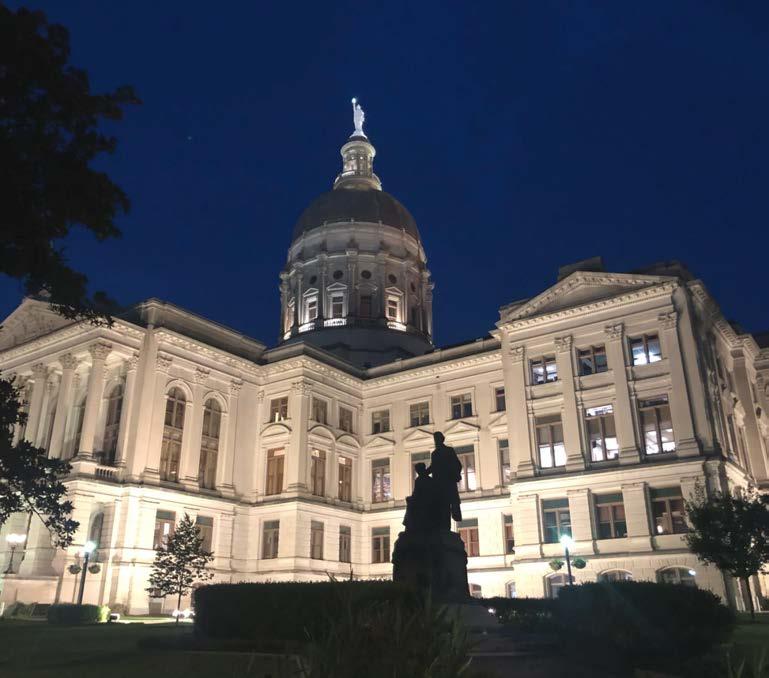

BY NOAH WASHINGTON
“Iwant to give people what I didn’t have when I was younger," Sierra Luchien, 39, founder of Greater Opportunity Regional Center (G.O.R.C) said. "The love, the guidance, the sense of belonging”.
As the founder G.O.R.C, Luchien dedicates her life to creating opportunities and resources for foster youth and underserved communities. Her advocacy extends through her nonprofit work, writing, and public speaking, all aimed at fostering empowerment and systemic change.
"I wanted to start the organization because I grew up in foster care," she said. Her early years were marked by a tragic loss when her brother, Carlton Luchien, passed away unexpectedly at just six months old. "His heart stopped, and he stopped breathing in my arms," she recalled. The death of her brother, followed by accusations against her mother, led to the eventual placement of Luchien and her siblings in foster care.
Raised in Los Angeles, Luchien experienced the challenges of the foster care system firsthand. As a teenager, she struggled with the trauma of her brother's death and her own feelings of abandonment. "I was placed in foster care, and you're not able to grieve," she said. "Instead of us grieving and being able to have that plethora of outlets to say, 'Hey, let's go to counseling,' nobody cared."
Luchien said the lack of emotional support led her down a rebellious path, eventually turning to the streets and becoming involved in gang life. She said, "I started gangbanging with the Rolling 60’s in California. It wasn't just about terrorizing; it was more like brother-sisterhood, a way to get things we didn't have at home."
While in foster care, Luchien found solace and wisdom from a woman she called "Grammy," who helped her learn to love herself. "She taught me how to love myself," Luchien says. "And that’s when I realized I could take what she gave me and give it to others." This epiphany laid the foundation for G.O.R.C.
Despite her struggles, Luchien was always an academically driven individual. "I was one of those kids that was always smart," she recalls, "but I felt like the world was looking at me differently. While other kids dreamed of playing with toys, I was thinking about survival." Her will to survive showed in everything she did, from excelling in schoolwork to hustling for money on the streets.
"I started working when I was 12," she recalls. "I went to get a work permit to work at a local pizza shop." This drive to earn was born out of necessity, but it also shaped her future ambitions, "My drive to learn was always


about how I could make things better for myself and my community," she says.
Luchien’s commitment to fostering
change culminated in the founding of G.O.R.C. She was inspired by the challenges she faced as a teenager in foster care and
noticed a significant gap in services for older youth, "I wanted to create an organization that expanded services for teens," she says. "I wanted to have a foster-to-adopt system where people could walk through the process step by step." Luchien has now seen to the placement of 150 children in her care.
In addition to providing shelter, G.O.R.C. addresses other pressing needs, such as food, clothing, and scholarships. "It wasn’t just about housing; it was about empowering people with the resources they need to thrive," Luchien explains. Her ultimate vision for the organization is ambitious, "I want to take this thing bigger than me. I want it to be global, to provide jobs and generational wealth long after I’m gone."
This vision began to take shape when G.O.R.C. was officially recognized as a 501(c) (3) nonprofit in early 2024. "That was the year we officially came into our own," she says. "It took a long time, but it was worth it. To learn more visit :https://www.greateropportunityregionalcenter.com/
BY WILLY BLACKMORE
As dignitaries and negotiators gather in Azerbaijan for COP29, the annual United Nations climate change conference — once again held in an oil-rich nation — newly-published data shows the world is warming faster than ever, with no sign of slowing.
A report published by Climate Action Tracker estimates that the planet is currently on track for 2.7 degree Celsius of warming by the year 2100. That’s not only hotter than the goal set in the Paris Agreement but also blows past the 2-degree threshold that many climate scientists believed to be a more achievable limit for warming.
That means the vulnerable — including Black American communities — will remain on the front lines of climate change and continue to bear the worst effects of a warming planet. It’s increasingly likely that more Black workers will die from heat-related illnesses and more Black neighborhoods will suffer through extreme weather, including flooding and deadly storms.
A new version of the Climate Action Tracker is released every year, and the organization’s estimate has not budged since 2021.
“Time is running out to meet the Paris Agreement goals,” Pierre Friedlingstein, a professor at Exeter’s Global Systems Institute, said in a statement. His organization led a carbon budget study showing there is “no sign” that peak global CO2 emissions have been reached.
Disastrous Future Forecast

Two new data sets show world leaders will miss key targets to keep average global temperatures from rising. That’s bad news for vulnerable Black communities on the front lines of the climate crisis. Photo Credit: iStock.com/Pratchaya
An annual global summit, COP29 where diplomats come together to continue to hash out plans designed to help the world meet the goals set out in the Paris Agreement to halt climate change. That historic treaty, reached at COP21 in 2015, legally requires nations around the world to cut carbon emissions that would keep the increase in average global temperatures
under 1.5 degrees Celsius.
But as the world is failing to reduce greenhouse gas emissions, and the possibility of meeting the 1.5-degree goal laid out in the Paris Agreement is beginning to slip away.
While 2024 is on track to be the hottest year ever, with global average tempera-
tures creeping above 1.5 degrees over twelve months for the first time in recorded history, that does not mean the Paris Agreement target is shot.
When pledges and plans from world governments are accounted for the outlook appears slightly better, at a global average of 2.1 degrees Celsius. Still, it would portend a disastrous future for Black America and other frontline communities already experiencing climate change-related devastation at far lower levels of warming.
The new goal is to keep the increase in the average global temperature over pre-industrial levels below that threshold for a matter of decades.
The single most important step to stave off the worst-case scenario — 2.7 degrees of warming by the end of the century — is to halt carbon emissions entirely. But the Global Carbon Budget report, typically published around the annual COP conference, says that in 2024 there was a slight increase of 0.8% in carbon emissions over last year.
Friedlingstein, the Exeter Global Systems Institute researcher, says there is little time to waste: world leaders in Azerbaijan “must bring about rapid and deep cuts to fossil fuel emissions to give us a chance of staying well below 2°C warming above pre-industrial levels.”
While the 1.5-degree goal is still technically alive, the carbon budget study shows how close we are to sailing past it entirely. At the current rate of emissions there’s a 50-50 chance that temperature averages will be above 1.5 degrees Celsius on a consistent basis by 2030.
BY ITORO N. UMONTUEN
Georgia House Democrats Thursday elected State Rep. Carolyn Hugley to serve as the Minority Leader, following a secret ballot election.
Hugley, was elected to the House in 1992, served as the Caucus Whip from 2002 through 2018. She will succeed outgoing Minority Leader, Dr. James Beverly, in the role.
“We’re going to be majority minded, we’re going to be member focused, and we’re going to continue to work,” Hugley said after the
vote concluded.
Hugley defeated State Rep. Derrick Jackson, a Democrat from Tyrone, for Minority Leader.
House Democrats also voted Thursday to retain Rep. Sam Park, D-Lawrenceville, as minority whip.
State Rep. Tanya Miller, a Democrat from Atlanta, will now be the Chairwoman of the House Minority Caucus. She beat State Rep. Billy Mitchell to win the seat. Miller was first elected to the House in 2022.
“We are taking stock of what happened this last election,” Miller told reporters. “I
think what you see reflected in this leadership is a desire for change and a desire to look at our electorate, our strategy, and how we reach the majority through a fresh set of eyes.”
Meanwhile, State Rep. Spencer Frye, a Democrat from Athens, will serve as Minority caucus Vice Chairman. State Rep. Park Cannon, a Democrat from Midtown Atlanta, will return as Minority Caucus Secretary.
After the Democrats did not achieve their goals after the redistricting fights in De-
cember, there were calls for new leadership. Though the Democrats picked up two seats in the House after November’s elections, the Republicans have 100 seats, a majority.
The 2025-2026 biannual Georgia Legislative Session gavels to order on January 13, 2025.
“I was part of this caucus when we were in the 60s in terms of numbers, but now we are at 80 and we’re going to continue to move forward,” Hugley told reporters. “So it’s about refocusing on our value proposition and raising the funds that we need and putting forth the candidates that we need.”
BY ANISSA DURHAM
With gun violence claiming more lives in the U.S. than ever before it’s no wonder that in June, U.S. Surgeon General Vivek Murthy officially declared it a public health crisis. Here’s why: Firearms are now the leading cause of death for kids and teens aged 1-19. And it’s not just “out there” — it’s personal. More than half of adults, 54%, say they or someone in their family have experienced gun violence firsthand.
But gun violence isn’t just a matter of statistics. It’s a crisis reshaping how Americans live, work, and feel in their communities — and that’s especially true for Black Americans.
In 2022, Black Americans had the highest rate of homicide deaths from a firearm compared to all other races and ethnicities. And Black children and adolescents accounted for about half of all fire-arm-related deaths among U.S. children and adolescents, despite only making up 14% of the youth population. Why does this matter?: Gun deaths are largely considered preventable. And Black American adults and youth are more likely to lose their lives to a firearm. The physical and mental health impact can be lifelong.
In 2022 alone, the Black firearm homicide rate among ages 15 to 19 was more than 25 times the white firearm homicide rate among the same age group, according to the Giffords Law Center to Prevent Gun Violence. And in 2022, more Black men ages 15 to 24 died in gun homicides than from unintentional injuries, suicide, heart disease, COVID-19, cancer, non-firearm homicides, diabetes, congenital abnormalities, chronic respiratory diseases, police shootings, cerebrovascular diseases, anemias, sepsis, influenza and pneumonia, and HIV combined For Black children and adolescents, 86% of firearm-related deaths were homicides, and 10% were suicides, the 2024 advisory states. Fears and worries about firearm violence are highly prevalent among youth, especially regarding school shootings. About half of young people ages 14 to 17 worry about school shootings.
Firearm-related deaths contribute significantly to the rising rates of preventable mortality and continue to drive down the U.S. life expectancy, according to a report by The Commonwealth Fund.
“By some estimates, firearm violence cost the U.S. around $557 billion in 2022, with $2.8 billion spent on health care costs, mental health services, and emergency services,” The Commonwealth Fund report states. “The largest proportion of this total was made up of costs related to quality-of-life, pain and
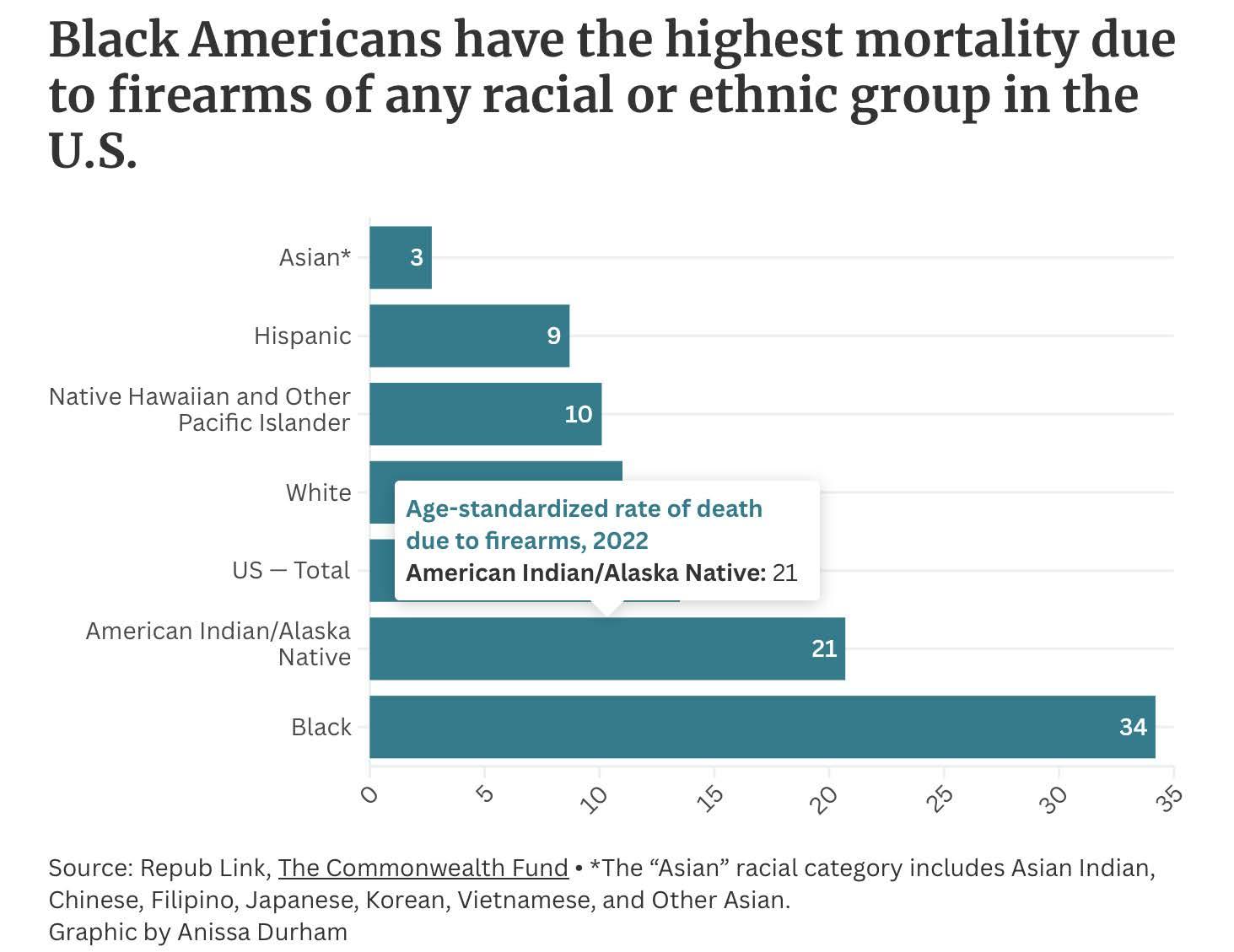

well-being lost by those injured or killed, and costs to families. Combined with billions in other losses, firearm deaths cost roughly $274,000 per victim and each injury costs over $25,000 per patient, equaling an average cost of $1,700 per taxpayer annually.”
Gun violence in America kills 40,000 people, wounds twice as many, and has had a devastating impact on the economy, according to Everytown Research and Policy. And whether an American owns a gun or not, taxpayers shoulder the bulk of the costs.
In Murthy’s advisory, he outlines a public health approach that can help prevent and reduce the harm caused by firearms. Here are a few of the suggestions to health care workers and policymakers.
Encourage health systems to facilitate education on safe and secure firearm storage. Health systems can support health workers in talking with patients during routine and preventive medical visits about the safe storage of firearms, as well as the temporary transfer of a firearm during a high-risk period. Implement universal background checks
and expand purchaser licensing laws. Universal background checks would expand on current federal law (which requires any person engaged in the business of dealing firearms to obtain a license and conduct background checks) to include mandatory background checks for all firearm purchases, including private sales and transferring/gifting firearms.
Ban assault weapons and large- capacity magazines for civilian use. Assault weapons may encompass automatic weapons and some semiautomatic weapons that may include military-style features that make the firearm more lethal, such as detachable large- capacity magazines.
Enhance safety measures and mental health resources in learning settings for children and adolescents. This can include the expansion of a school-based mental health workforce to build a positive school climate and the capacity and resources needed to connect students to mental health services.
Bottom line: The death of Black Americans from gun violence, in many ways, can be prevented. It’s up to policymakers to decide how many more Americans will die because of firearms.
do next?

BY LAURA ONYENEHO
Social media is best known as a place where flaunting your latest purchase or sharing your vacation snaps is the norm. A new trend has emerged on TikTok that encourages the opposite: being loud about not spending. “Loud budgeting,” a money-saving technique, is all about putting your financial goals first and being unapologetic about it.
Coined by TikTok and media personality Lukas Battle, loud budgeting has gained traction as more young people look for ways to manage their finances without succumbing to the pressure of social obligations. Battle describes the concept as follows: When invited to social events—whether dinner with friends, a birthday trip, or a lavish destination wedding—you should feel comfortable saying no if it jeopardizes your financial goals. What’s more, you should be honest about why you’re declining.
Jade Warshaw, a debt elimination expert, financial coach and co-host of The Ramsey Show, is known for paying off more than
$460,000 in debt with her husband in seven years. She has used her social media platforms to help her followers strategize their way to financial freedom. She has been ‘Loud budgeting’ for over 30 years.
“I would say a good budget is detailed, realistic, and flexible,” she explained to her TikTok followers. “If you want to take it to the next level, make a zero-based budget. A zero-based budget is spending every single dollar on paper before the month begins, and you create a new budget every month because every month is different.”
At its core, loud budgeting is about being open and vocal about the reason behind your financial decisions. For years, people have felt the pressure to keep up appearances, often accepting costly invitations even when it strain their wallets. With loud budgeting, that social stigma is flipped on its head. Instead of silently declining or feeling guilty about not participating, individuals are encouraged to proudly declare that they prioritize their financial well-being.
By making your budgeting decisions loud,
you normalize discussions about money and create space for others to do the same. It’s not just about saving money—it’s about being transparent about your financial goals and feeling empowered to set boundaries regarding your spending. This transparency can alleviate financial stress and open up conversations about how others might feel similar financial pressures but are too afraid to speak up.
According to the American Psychological Association’s 2023 Stress in America study, 45% of respondents feel embarrassed to discuss money with others. Money was one of the biggest sources of stress for respondents in every age group, with the exception of those over 65.
In a world where financial literacy isn’t always prioritized, trends like loud budgeting allow young people to engage in financial conversations that might otherwise feel intimidating. It challenges the societal norm that you need to say “yes” to every invitation or opportunity that comes your way, regardless of how it impacts your finances.
This trend is significant because it highlights the financial struggles many young people face today—particularly in a time of rising student debt, housing costs, and inflation. Financial pressure is real for many Millennials and Gen Z, and a sense of guilt is often tied to saying no to social plans. Loud budgeting removes that guilt and replaces it with empowerment. It says,
Being loud about budgeting sends a powerful message that saving money and making responsible financial decisions shouldn’t be something to hide. With so much social media revolving around consumerism and “living your best life,” loud budgeting brings balance to the narrative by emphasizing that there’s strength in saving—and there’s nothing wrong with declining an invite if it helps you meet your financial goals.
“We, especially as women, need to become more serious about creating a generation of people, specifically adults, that are financially literate,” said content creator Naomi Ny. “That means teaching our sisters, mothers, and aunties. Anybody in your family who doesn’t understand how money works or specifically their money.”




